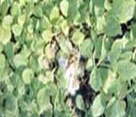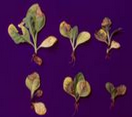Agricultural crops :: Cash crops :: Tobacco
Damping off: Pythium aphanidermatum, Pythium debaryanum
Symptom
-
Damping off is a serious problem in tobacco nurseries both in heavy clay soils and light sandy soils.
-
It is caused by several soil inhabiting fungi predominant being Pythium aphanidermatum, pythium debaryanum,Phytophthora sp. and some times Rhizoctonia solani are also involved.
-
The disease may appear at any stage of the seedlings but maximum damage is observed 5-6 weeks after sowing.
Disease is noticed in two phases, viz.
- Pre-emergence damping-off
- Post-emergence damping-off
Pre-emergence damping-off
Post-emergence damping-off
-
Post emergence damping- off is the most destructive phase.
-
The tiny two leaved seedlings may disappear due to wet rotting of stems and the seedlings stand diminishes daily.
-
Generally damping-off occurs in patches which spread quickly if unchecked.
-
The older seedlings show shriveling and brown discoloration of the stems near the soils and start rotting under wet soil conditions.
-
The decayed stems collapse and seedlings topple over leaving parchment like brown crest over the soil.
-
The wet rotting and sudden collapse of seedlings starts in circular patches and under wet weather conditions may extend over the whole seedbed causing near total loss.
|
|
| Management |
-
Deep ploughing in summer destroys the fungus
-
Preparation of raised seed beds 15 cm high with channels around to provide drainage
-
Rabbing the seed bed before sowing with slow burn farm waste materials like paddy husk, tobacco stubbles, waste grass and palmyrah leaves etc.,
-
Use seed rate 3 g/ha only to avoid over crowding of seedlings.
-
Regulate waterings to avoid excessive dampness on bed surface.
-
Bordeaux mixture 0.4% @ (40 gm of copper sulphate +40 gm of lime in 10 litres of water) or Copper oxychloride @ 0.2% (20 gm in 10 litres of water) is to be applied with rose can to a bed of 10 sq.m area 2 weeks after sowing.
-
Two to three spray drenchings of beds with 0.2% Metalaxyl comencing three weeks ofter seed sowing (20 g of Metalaxyl in 10 l of water).
-
This has to be repeated once in 4 days under normal weather conditions and once in 2 days under wet and cloudy conditions. In case of heavy rain, the application has to be repeated.
Schedule of application
-
Application of fungicide should be given one week after completion of germination.
-
Subsequent application, depending upon weather conditions, should be given at 4 days interval if it is bright, sunny and dry, and 2 days when it is cloudy and wet weather. Application should be repeated after every rain.
-
Approximately 40 litres of spray fluid for 40 m2 of seedbeds, applied through a rose-can or 20 litres through knapsack sprayer is required for each application.
|
|




